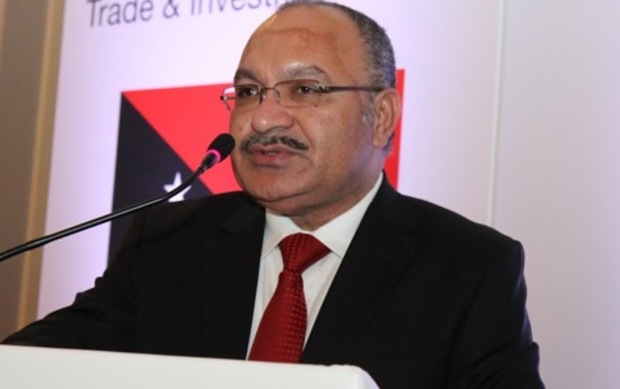BEIJING, 22 JUNE 2018 (POST COURIER/SMH) – The Papua New Guinea Government and Business delegation, headed by the Prime Minister, Peter O’Neill, was accorded full ceremonial honours by the Government of China on their arrival in Beijing overnight.
Prime Minister O’Neill, Lynda Babao-O’Neill, senior Government Ministers and Members of Parliament, together with a delegation of senior business representatives, now begin a series of engagements that includes bilateral meetings with the Premier and President of China, and current and potential Chinese investors.
“Papua New Guinea must reach out and engage with our foreign partners so we can increase trade, stimulate business and create new jobs,” the Prime Minister said.
“China is now the second largest economy in the world and has an enormous market potential for our exports.
“This includes exports of oil and gas, but now that we are broadening our own economic base in areas such as agriculture and tourism, we can attract future business from China.
“This is important for current economic growth, and even more important, the economy opportunities we are creating for our children and future generations,” he said
Papua New Guinea will become the second Pacific nation to sign up to China’s massive Belt and Road Initiative infrastructure program, further tying Australia’s nearest neighbour to Asia’s economic giant.
In a development likely to be watched closely in Australia, PNG Prime Minister Peter O’Neill is set to sign up to China’s signature strategic and economic programme during a week-long visit that will include meeting with Chinese President Xi Jinping.
O’Neill, who is in Beijing accompanied by a large government and business delegation, confirmed ahead of his trip that he would join East Timor as the only countries in the Pacific region to formally endorse the programme, paving the way for more Chinese infrastructure development.
“When in China, we’ll be signing the ‘One Belt, One Road’ initiative,” O’Neill said.
“That is a great potential for Papua New Guinea, which means that this will help integrate our own economy to the global economy … The rest of the world is making business with China and we cannot simply sit back and allow these opportunities to go by.”
The exact terms of agreements signed between China and partner countries on the Belt and Road Initiative (BRI) vary and tend to be broad. But they commit each country to working with China on infrastructure projects badged under the $US1 trillion ($1.3 trillion) programme.
Crucially, O’Neill said he would not sign PNG up to any more Chinese loans during his visit.
Australian Foreign Minister Julie Bishop told Fairfax Media recently that Australia was concerned Pacific nations may be entering some financial arrangements with China that would “be detrimental to their long-term sovereignty” and wanted to make sure they were “not trapped into unsustainable debt outcomes”.
The Lowy Institute has calculated that Chinese-built infrastructure and construction projects totalled US$858.4 million in the decade to 2016.
Jonathan Pryke, director of the institute’s Pacific Islands programme, said the pace of building by China had “if anything increased since 2016”.
PNG owes China nearly US$2 billion arising from concessional loans, according to the ABC – nearly a quarter of its total debt.
Pryke said the Australian government would likely be looking at this latest demonstration of deepening PNG-China ties “with a fair degree of anxiety”.
“[China] is really rolling out the red carpet,” he said. “They’re just investing more into an already pretty deep relationship.”
For O’Neill, this was part of a “look north policy” which is diversifying PNG’s strategic relationships, he said.
O’Neill has visited Australia six times since the Coalition took office in 2013 but not once as an official “guest of government”.
“It should be motivating us to up our game,” Pryke said.
But he added that Australia was clearly doing more to engage with Pacific leaders overall.
Solomon Islands Prime Minister Rick Houenipwela paid an official visit last week. And next week, Vanuatu Prime Minister Charlot Salwai will be a guest of the Australian government for a six-day visit.
Charles Abel, PNG’s Deputy Prime Minister, spoke at the Lowy Institute on Monday night and signalled there were some concerns in the country about China’s involvement. While Chinese aid and investment was providing opportunities to his country, it was also presenting challenges that Australia needed to help “balance”, he said.
“Some of the things that the Chinese interaction brings are not necessarily conducive to good governance, particularly if some of our country’s institutional frameworks are weak,” he said.
“We very much need our traditional partners to continue that engagement in the region and in Papua New Guinea to make sure there’s some balance brought there and support us in this development process.
“Whilst we appreciate the interaction with China, there remains some concerns in terms of the way they do conduct business.”
Some Chinese firms involved in PNG have raised concerns internationally because of their practices.
Several projects have been built by the China Harbour Engineering Company, a state-owned construction firm that was blacklisted by the World Bank for most of the past seven years for “fraudulent practices” on a previous Philippines road project.



